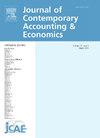Analysts’ revenue forecasts and discretionary revenues
IF 2.9
3区 管理学
Q2 BUSINESS, FINANCE
引用次数: 0
Abstract
We investigate the association between analysts’ revenue forecast coverage and firms’ revenue manipulation. We find that coverage of revenues by financial analysts relative to earnings is positively associated with the magnitude of firms’ discretionary revenues. This finding shows a pressure effect of analysts, where analysts’ revenue forecasts induce incentives for managers to manipulate revenues to meet expectations. Our cross-sectional analyses show that this pressure on discretionary revenues is higher during the fourth fiscal quarter. This effect is also more pronounced for firms whose revenues are more value-relevant and when analysts exhibit greater disagreement over revenue forecasts. Further evidence related to ASC 606, a major GAAP change about revenue accounting, provides corroborating evidence for the pressure effect. Robustness checks confirm the validity of our findings and offer further insights into the role of revenue forecasts in revenue manipulation.
分析师的收入预测和可自由支配的收入
我们研究了分析师收入预测覆盖率与公司收入操纵之间的关系。我们发现,金融分析师对收入相对于收益的报道与公司可自由支配收入的大小呈正相关。这一发现显示了分析师的压力效应,即分析师的收入预测会促使管理者操纵收入以满足预期。我们的横断面分析显示,在第四财政季度,这种对可自由支配收入的压力更大。对于收入与价值相关性更强的公司,以及分析师对收入预测的分歧更大的公司,这种影响也更为明显。进一步的证据与ASC 606有关,这是一项关于收入会计的主要GAAP变更,为压力效应提供了确凿的证据。稳健性检查证实了我们的研究结果的有效性,并进一步深入了解收入预测在收入操纵中的作用。
本文章由计算机程序翻译,如有差异,请以英文原文为准。
求助全文
约1分钟内获得全文
求助全文

 求助内容:
求助内容: 应助结果提醒方式:
应助结果提醒方式:


